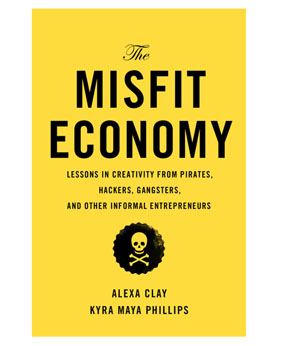Author: Alexa Clay and Kyra Maya Phillips
ISBN No: 9781451688825
Review date: 19/04/2024
No of pages: 256
Publisher: Simon & Schuster
Publisher URL:
http://www.misfiteconomy.com/book.php
Year of publication: 02/09/2016
Brief:
Misfit Economy: Lessons in Creativity from Pirates, Hackers, Gangsters and Other Informal Entrepreneurs by Alexa Clay and Kyra Maya Phillips
Gang leaders, Somali pirates, bootleggers, counterfeiters, hustlers, and others living and working on the margins of society, as creative business people: in summary, the idea of Misfit Economy by Alexa Clay and Kyra Maya Phillips. Or as the sub-title puts it; Lessons in Creativity from Pirates, Hackers, Gangsters and Other Informal Entrepreneurs.
Somali piracy, the authors trace, turned from a self-funded force into a ‘well-invested, transnational multi-million dollar industry’, and the spoils sent (laundered?!) as far as India and Dubai. Pirates employ lawyers; and banknote checkers, ‘who use machines to detect fake money’ – because criminals don’t want to be victims of crime!? The authors are quick to give a disclaimer; that they do not seek to glorify or endorse criminals; it’s just that their strategies and ways of working mirror legitimate business, that works according to law, or as the authors put it, ‘formal markets’. “The free market economy does not possess a monopoly on innovation.” While the book is alluringly well written, it does rather skate over morals, by arguing that ‘entrepreneurial misfits’ are not deviants, ‘branded as outsiders’, but entrepreneurs. Would the authors mind if someone had stolen their manuscript and published it as their own?! Of course not. Would the authors like to live in a port city ruled by pirates or drink bootleg alcohol (at their own risk)? Patents, and all the tiresome rules of formal business, are there for a reason – public protection – rather than as some sort of racket to keep out the ‘Informal Entrepreneurs’.
We may recall the senior policeman in Manchester who said that ‘our gang is bigger than your gang’, referring to the forces of authority against gang crime. The authors make the same point: “Working for a Mexican drug cartel can be a lot like working for Exxon; you are subjected to a hierarchical command and control system.” The authors note that countries may be in ‘disarray’ and misfits seize opportunity when legalities just aren’t around.
All that is leaving to one side, rather, the effects of drug and human trafficking, and the violence of serious and organised crime, as altogether more harmful to human bodies than, say, the rag trade in counterfeit or knock-off fashion clothing. And is it really like working for a multi-national oil and gas firm, selling illegal drugs?! Even if it is, are the consequences to the countries you market in, the same?! Another yet more intriguing idea is that there isn’t black or white economies but grey; what of the so-called white collar criminals, who outwardly conform, and excel in the legal economy, but are fraudsters? Or entire companies – what is the comparison is not with Exxon, but Enron?!
In the authors’ eyes, their book isn’t about Steve Jobs, Thomas Edison, Henry Ford. It’s about people you’ve never heard of. It’s about people who are just as innovative, entrepreneurial, and visionary as the Jobses, Edisons, and Fords of the world, except they’re not in Silicon Valley. They’re in the crowded streets of Shenzhen, the prisons of Somalia, the flooded coastal towns of Thailand. They are pirates, computer hackers, pranksters, and former gang leaders.
As the authors see it, diverse innovators operating in the black, grey, and informal economies are developing solutions to a myriad of challenges. Far from being “deviant entrepreneurs” that pose threats to our social and economic stability, these innovators display remarkable ingenuity, pioneering original methods and practices that we can learn from and apply to move formal markets.
This book investigates the stories of underground innovation that make up the Misfit Economy. It examines the teeming genius of the underground. It asks: Who are these unknown visionaries? How do they work? How do they organize themselves? How do they catalyse innovation? And ultimately, how can you take these lessons into your own world? More reading at http://misfiteconomy.tumblr.com/.









